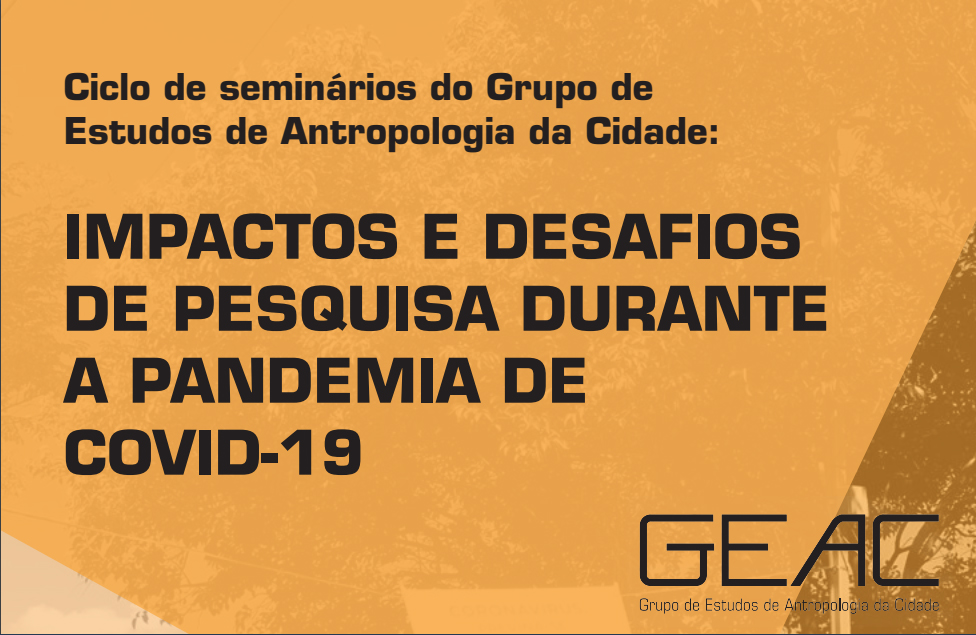Seminar cycle of the Anthropology Study Group of the City
Mondays, Wednesdays and Fridays at 19h from 8/26 to 9/04
live streams on GEAC's YouTube channel: www.linktr.ee/geac
Among the questions that emerge in the current pandemic, it is emphasized that it is possible to research, from an ethnographic point of view, facing the restrictions of various orders to face-to-face social interactions, given the necessary care to avoid the transmission of Covid -19. The present cycle of seminars seeks to dialogue with this reality, with an emphasis on the ongoing changes in urban life, through the approach on ongoing research by members of GEAC (in speech with other researchers), whose impacts resulting from the pandemic have led to both changes contextual, regarding the need for new investigative strategies.
Seminar coordinated by Heitor Frúgoli Jr. (professor at FFLCH-USP), who guides (or supervised) the work of the presenters of the second, third and fourth seminars, and supervised the work of the fifth presenter (supervised by Eduardo Nivón Bolán); the first presenter has the guidance of Luiz Eduardo P. B. T. Dantas.
Session 1: Cyclists delivering digital platforms
With Eduardo Rumenig (PhD student at the School of Physical Education and Sport, USP)
8/26, Wednesday, 7:00 pm
The bicycle and information and communication technologies (ICTs) figure as constitutive elements of the world of work and the contemporary urban landscape. Based on three axes - body of cyclists, sociability anchored in platform and city capitalism - we will reflect on the dis / utopias inscribed in the use of the bicycle subsumed to platform capitalism in the city of São Paulo.
Session 2: Football fans: networks and sociability in the Brazilian context of the pandemic
With Mariana Mandelli (Master in Social Anthropology, PPGAS-USP)
Invited: Luiz Henrique Toledo , professor at UFSCar
8/28, Friday, 19h
In a moment of deprivation of the stadium, the fans gained prominence by participating in anti-fascist protests and by solidarity actions with their respective communities. The idea is to discuss how clubism becomes an agent of these and other social networks in addition to the game itself.
Session 3: The exception and the insistent invisible: the transgressive presence of the homeless in the central region of São Paulo in times of coronavirus
With Leandro Carneiro de Souza (Master's student in Social Anthropology, PPGAS-USP)
Invited: Tomás Melo , professor at PUC-PR and member of INRUA (National Institute of Human Rights of the Street Population)
8/31, Monday, 7:00 pm
Based on the notion of invisibility generally attributed to the homeless population, we seek to understand State policies in the context of the pandemic, the narratives produced by the media, the ways in which this population reconfigures space and social relations and challenges the order and look of city dwellers.
Session 4: Leisure, periphery and pandemic: rearranging spaces and leisure practices
With Wesllen Cosme de Souza (Master's student in Social Anthropology, PPGAS-USP)
Invited: Enrico Spaggiari, PhD in Social Anthropology (PPGAS-USP)
9/02, Wednesday, 19h
With the pandemic, forms of leisure in public spaces have been impacted, gaining specific outlines in peripheral areas, whose practices are different from those observed in middle-class neighborhoods. It is intended to address the new strategies and possibilities of meeting and enjoying leisure in a neighborhood on the periphery of a city in the metropolitan region of São Paulo.
Session 5: What the enclosure must escape: reflection on my confinement in São Paulo, Mexico City and Tijuana
With Orlando Elorza Guzmán (PhD student at Universidad Autónoma Metropolitana - Iztapalapa (UAM-I))
9/04, Friday, 19h
This reflection consists of my experiences during confinement in the last stage of fieldwork in São Paulo; I return to my country and Ciudad de México after six months of absence; so how to start living in Tijuana for the first time, a city at the countries border. This global crisis has given me a personal view from three sides, in which I test the similarities and differences of the contextual intimacies of these three great cities.


